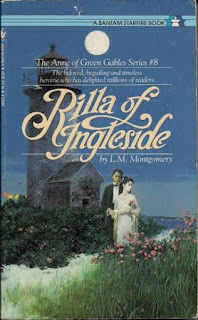Reality, Imagination, and Walter Blythe (Courtney McKinney-Whitaker)
It's taken me a long time to get around to writing
this post because I've been trying to decide which of my most rational and
irrational fears are worthy of a look.
I keep coming back to Walter Blythe.
One of my favorite novels is Rilla of Ingleside by L.M. Montgomery. It's the eighth and last
book in the Anne of Green Gables series.
The main character is Rilla Blythe, Anne and Gilbert's youngest child, who
lives out her teenage years on the Prince Edward Island home front during World
War I. Rilla of Ingleside introduced
me to the Great War, formed one of my historical obsessions, and recruited me
to the "Boo-Hoo Brigade" of people who think the Great War was a
senseless tragedy and still cry about it sometimes.
 |
| This is the cover of my copy. The covers of Rilla have been rightly criticized for attempting to reduce the book to a historical romance. It is a book that is not easily pigeonholed and thus has trouble attracting readers. Lord, how I sympathize with Montgomery on that. Cool article that should persuade you to read the book, here. |
(Spoiler Alert: I'm going to talk about the book, so
don't keep reading if you don't want to know what happens. If you've read it,
give me a shout out. I rarely encounter anyone who made it to the 8th
Anne book.)
One of the major conflicts is the response of
Rilla's three brothers to the war. At the outset, only Jem and Walter are of an
age to enlist, and Jem does so without hesitation. Walter doesn't. He waits,
he's not sure, about the war or about his own participation in it. Walter is
the poet, the one who inherited Anne Shirley's imagination and way with words.
The war has him imagining terrible things. He's not afraid of being hurt or
even of dying. He's afraid of what war will do to his mind, of what he will be
asked to do and how it will affect him.
In the patriotic furor of the first year of the war,
Walter suffers the consequences. He's called a coward, someone sends him a
white feather (a common way to accuse men not in uniform of cowardice).
Walter does eventually join up and is killed in
action. But before that, this happens.
"He should have had the V.C.," said Susan, and was very indignant over it. She was not quite sure who was to blame for his not getting it, but if it were General Haig she began for the first time to entertain serious doubts as to his fitness for being Commander-in-Chief.
Rilla was beside herself with delight. It was her dear Walter who had done this thing--Walter, to whom someone had sent a white feather at Redmond--it was Walter who had dashed back from the safety of the trench to drag in a wounded comrade who had fallen on No-man's-land. Oh, she could see his white beautiful face and wonderful eyes as he did it! What a thing to be the sister of such a hero! And he hadn't thought it worth while writing about. His letter was full of other things--little intimate things that they two had known and loved together in the dear old cloudless days of a century ago.
After the war ends and Jem returns, Rilla asks him if he was ever afraid.
"Afraid! I was afraid scores of times--sick with fear--I who used to laugh at Walter when he was frightened. Do you know, Walter was never frightened after he got to the front. Realities never scared him--only his imagination could do that. His colonel told me that Walter was the bravest man in the regiment."
I've held that line in my heart for a long time because it describes me so well.
Realities never scared him—only his imagination could do that.
It's probably an occupational hazard of being a writer. I know from experience that I'm surprisingly calm and controlled and even brave in a real crisis. But nothing can have me cowering under the covers quicker than all the imaginary scenarios my mind can throw at me.
I did read Rilla of Ingleside and although I liked it better than Rainbow Valley (which wasn't even really about Anne's family), it didn't get to me in the way that the first 4 books did, nor Anne of Ingleside (book 6). I'm not sure why. When I reread the series, I usually read 1 through 4 and then Anne of Ingleside and stop there. (Anne's House of Dreams I reread sometimes, but less often.) I think there is a distance, a detachment, to much of the storytelling in Rilla.
ReplyDeleteWalter's death also was predicted at the end of Anne of Ingleside, so we knew it was coming.
I read 1-5 over and over before I ever touched the last three. You can tell when you see the various levels of wear on my copies. Anne of Ingleside was the one I connected with the least, and I never connected much to Rainbow Valley, either. If I'm remembering right, it was written long after the rest of them, in response to publisher's demand. She might have been writing under the assumption that anyone who read Ingleside had already read Rilla.
Delete